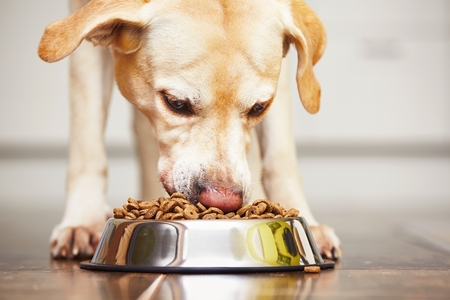Labrador dogs genetically always hungry, scientists say

A hungry labrador retriever feeds at home. INQUIRER.net Stock photo
Labrador retrievers are one of the most popular dog breeds in the world due to its loyalty, friendliness and trainability.
But as most Lab owners find out, the breed could sometimes be too fond of food and is very susceptible to being overweight.
A recent study by University of Cambridge researchers revealed that owners shouldn’t fret if their pets get too plump, as Labradors and flat coat retrievers are genetically obsessed with food.
“This is a common genetic variant in Labradors and has a significant effect on those dogs that carry it, so it is likely that this helps explain why Labradors are more prone to being overweight in comparison to other breeds,” lead researcher Dr. Eleanor Raffan said in a Telegraph report.
The findings were gathered from genes of 310 Labradors and also based on criteria from a “food motivation” using an owner questionnaire.
Almost a quarter of subjects were deemed to carry Pro-opiomelanocortin (POMC variant) in their bodies, which is one of three potential obesity-related genes.
Furthermore, dogs with at least a single POMC gene carried were 1.9 kg heavier than normal, the report said.
Much like with humans, obesity in dogs reduces quality of life and can further increase risk of joint disorders such as arthritis.
“But equally, being hungry is a welfare issue, and these dogs are genetically hungry,” Dr Raffan added.
Since Labs are more prone to gaining pounds, Raffan stressed the importance of daily exercise for the energetic pets.
“Food is often used as a reward during training, and carrying this variant may make dogs more motivated to work for a titbit,” he said. Khristian Ibarrola /ra